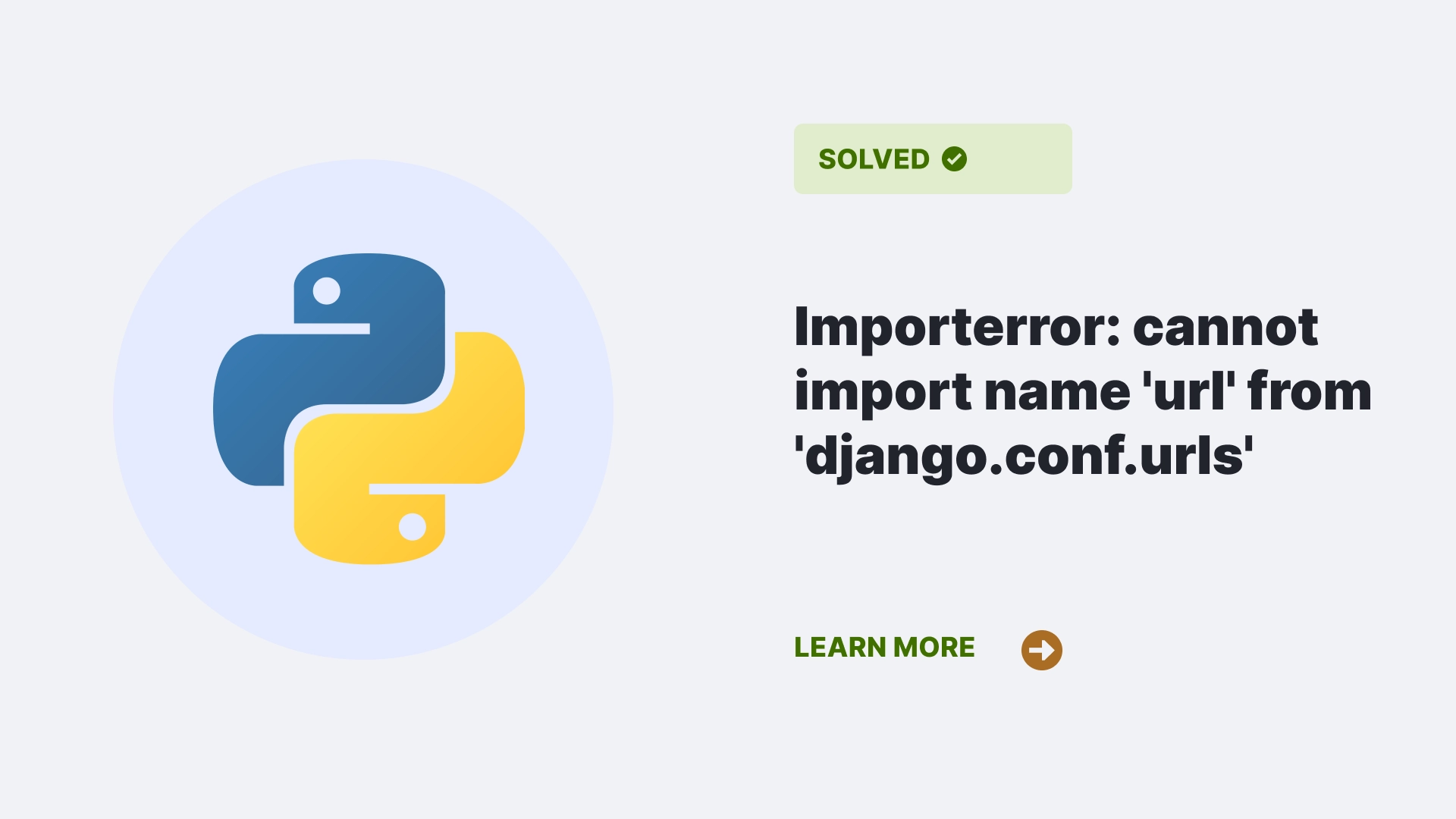Hello coders, today we’ll discuss a common error you might encounter when working with Django, a popular Python web framework. The error message reads: “importerror: cannot import name ‘url’ from ‘django.conf.urls’“
Contents
- 1 Overview
- 2 What is the “importerror: cannot import name ‘url’ from ‘django.conf.urls'” error?
- 3 What causes the “importerror: cannot import name ‘url’ from ‘django.conf.urls'” error?
- 4 Code Examples
- 5 How to resolve the “importerror: cannot import name ‘url’ from ‘django.conf.urls'” error?
- 6 FAQs
- 7 Conclusion
- 8 References
Overview
If you’ve used Django, you’ve likely written a block of code importing url from django.conf.urls. With the introduction of Django 3.0 and the removal of this function in Django 4.0, your block of code is throwing the error: “importerror: cannot import name ‘url’ from ‘django.conf.urls’“.
This error can show up when running a Django application that has not been updated to match changes in Django’s URL handling mechanism. Understanding this error fully is essential to solving it.
What is the “importerror: cannot import name ‘url’ from ‘django.conf.urls'” error?
This error occurs when you try to import the url function from django.conf.urls, but Django can’t find it. Starting from Django 3.0, this function was deprecated and it was fully removed in Django 4.0+. This means that it’s no longer available for use and attempting to import it will result in this error message.
What causes the “importerror: cannot import name ‘url’ from ‘django.conf.urls'” error?
The main reason for this error is the deprecation and removal of the url() function from Django’s URL handling module. If your Django application code still tries to import and use the url() function from django.conf.urls, you will run into this error.
Code Examples
The typical code that causes this error is similar to the following:
from django.conf.urls import url
from .views import home
urlpatterns = [
url(r'^$', home, name='home'),
]How to resolve the “importerror: cannot import name ‘url’ from ‘django.conf.urls'” error?
To solve this error, consider these two methods:
A. Using re_path()
You can fix the error by replacing url() with re_path(). Like url(), re_path() function uses regular expressions to define URL patterns. First, import re_path from django.urls, then replace url with re_path in your urlpatterns:
from django.urls import include, re_path
from myapp.views import home
urlpatterns = [
re_path(r'^$', home, name='home'),
re_path(r'^myapp/', include('myapp.urls'),
]B. Using path()
You can also replace url() with path(). However, note that path() does not use regular expressions, so you’ll have to adjust your URL patterns accordingly:
from django.urls import include, path
from myapp.views import home
urlpatterns = [
path('', home, name='home'),
path('myapp/', include('myapp.urls'),
]Also, if you’re dealing with a substantial project with lots of URL patterns to update, you might find the django-upgrade library useful.
If you want a quick fix, the following is an option:
Replace:
from django.conf.urls import url
With:
from django.urls import re_path as urlThe rest of your code remains unchanged.
FAQs
1. Why was url() deprecated in Django?
‘url()‘ was deprecated because its functionality is covered by both ‘re_path()‘ and ‘path()‘. These functions provide more straightforward ways to define URL patterns.
2. What is the difference between path() and re_path()?
‘path()‘ is simpler and does not use regular expressions. It’s great for simple URL patterns. On the other hand, ‘re_path()‘ allows for more complex patterns as it does use regular expressions.
Conclusion
Understanding the cause and solution to the “Importerror: cannot import name ‘url’ from ‘django.conf.urls'” error keeps your Django project bug-free and up-to-date. Always remember, with any deprecation, it’s crucial to update your applications to use the updated features to avoid runtime errors. Keep coding, and happy Django-ing!
References
Follow us at PythonClear to learn more about solutions to general errors one may encounter while programming in Python.

